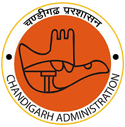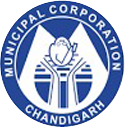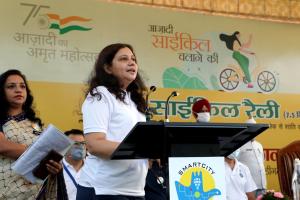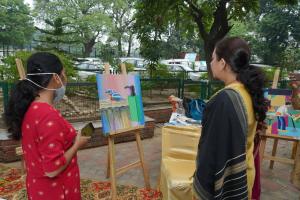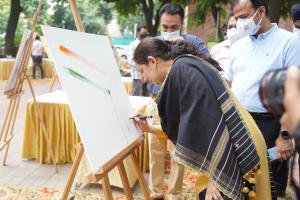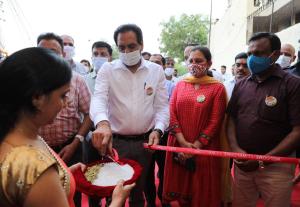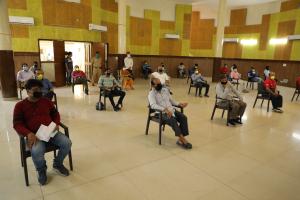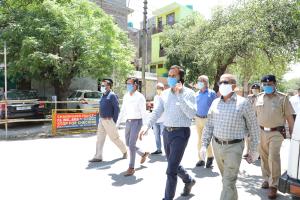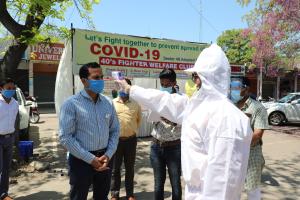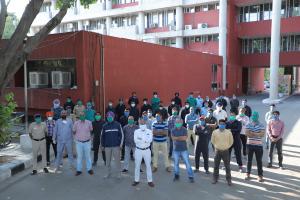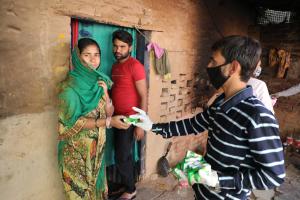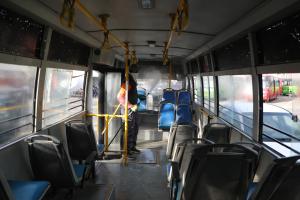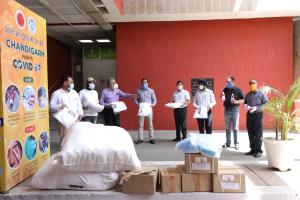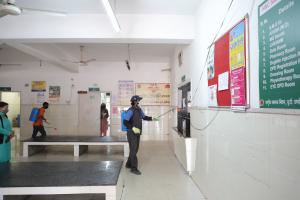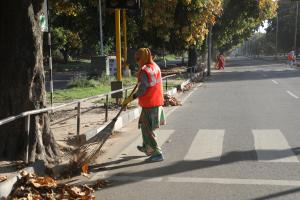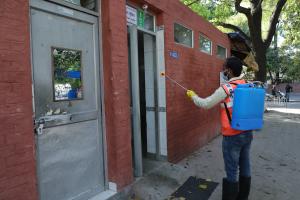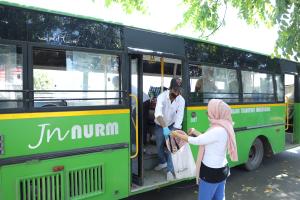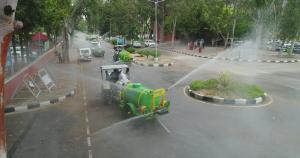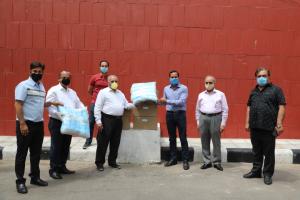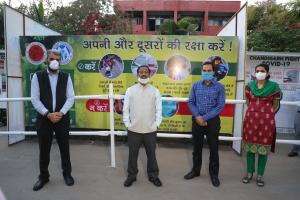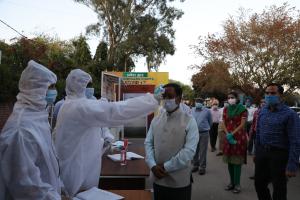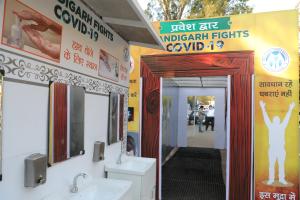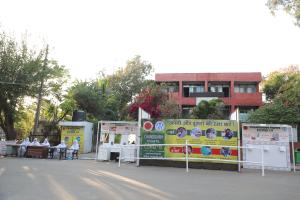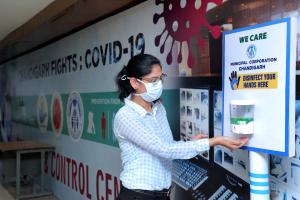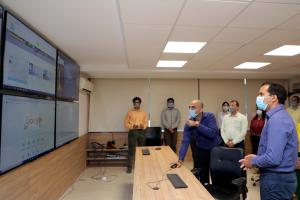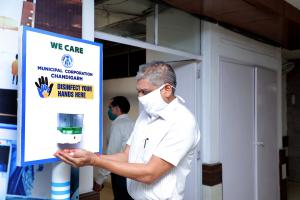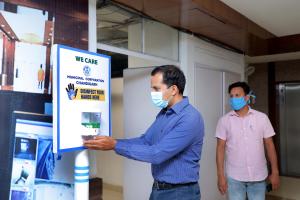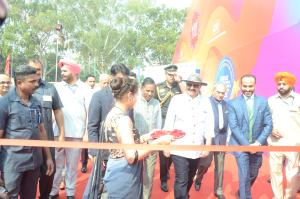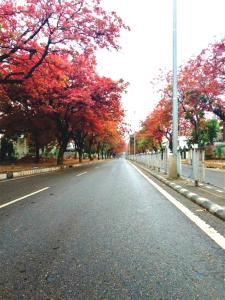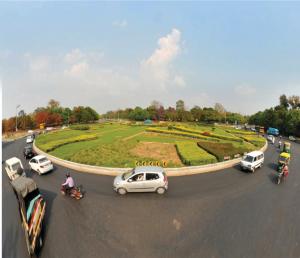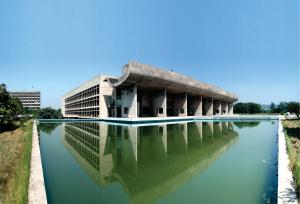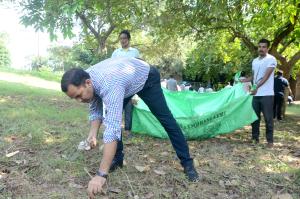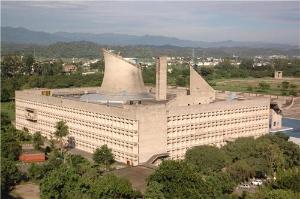Home
- 01
- 02
- 03
- 04
- 05
- 06
Chandigarh Smart City
The city beautiful is envisioned to become leader in liveability, sustainability, equality and innovation.
Smart city mission envisions providing for the aspiration and needs of the citizens, developing the entire urban ecosystem, which represents by the four pillars of comprehensive development-institutional, physical, social and economic infrastructure and work towards developing such comprehensive infrastructure incrementally adding on layers of “Smartness”.

 What's New
What's New
What's New
Latest Projects
1. Battery Operated Golf Cart(10nos.) for elderly and disabled people |
|
2. SCADA System (Recycled water network) |
|
3. Development of Basic Infrastructure For Smart Schools (civil Work) |
|
4. Smart classroom in 5 schools of the ABD area |
|
5. Selection of system integrator for implementation of e-governance services in Chandigarh |
|
6. Underground Utility Mapping |
|
7. Legacy waste mining at Dadumajra dumping site |
1. Structure for ICCC building |
|
2. Monitoring of Individual Street Lights |
|
3. Incinerator for Animals Carcass |
|
4. Rehabilitation and up gradation of 5 STPs and construction of 1 STP at Kisangarh |
|
5. Operation and Maintenance of Battery Operated Carts(10nos) for Movement of Elderly And Disabled in Sec 17 |
1. Public Bike Sharing |
|
2. MRF and GTS at 3 locations (mechanical work) |
|
3. MRF and GTS at 3 locations (civil work) |
1. Development of Basic Infrastructure for Smart Schools (classes and laboratory furniture) |
|
2. Selection of MSI for ICCC |
|
3. Provision of services in ICCC building- Internal Furnishing |
|
4. Command Centre for Police |
|
5. 24x7 water supply (Pan City) |
|
6. Mobile Van for Hearing Screening for Elderly |
|
7. Provision of SCADA for Solid Waste Management for Route Management, Efficiency Of Collection, Mobile Application, Daily Management of solid waste including Dry/Wet as per Swachh Bharat Standards and O&M for 5 years. |
1. Minor Sport Infrastructure in Parks |
|
2. Re-use of Space Below Bridge along with Street Art |
|
3. Journey Planner |
|
4. Water ATMs at 20 locations |
1. Sensory park for disabled |
|
2. Construction and Management of sanitary landfill sites |
|
3. Place making |
Cycle4Change Challenge
HEALTHY STREETS POLICY: CHANDIGARH
Table of Contents
Healthy Streets Pledge
Preface
Healthy Streets are streets where...
Approach
Key Steps to achieve Healthy Streets
Message from the Champion
Dear friends,
Transport systems influence a major part of our everyday lives. In Chandigarh, most journeys take place by foot, cycle, or public transport, through our network of streets. It is our duty to make these streets healthy for the well-being of our citizens, to empower local businesses, and for the safety, liveability, and resilience of the city.
Chandigarh has embarked on multiple initiatives in the past to provide a safe, efficient, and inclusive transport system. It has invested in creating best walking, cycling, and public transport projects. It has also recently started its Public Bike Sharing system, with 617 docks and 5000 bicycles. Another recent initiative is installation of street lights on the cycle tracks.
The COVID-19 pandemic has also highlighted the need for better streets and transport systems which will benefit all users, especially the most vulnerable. Chandigarh has responded to the pandemic by transforming streets for walking and cycling through pilot initiatives. However, there are many measures still required to inspire and ensure widespread change. By creating Healthy Streets, Chandigarh envisions a city that is livable, resilient, and one that is created by the people, for the people.
The Healthy Streets Policy is a guiding vision that will enable Chandigarh to carry out strategic changes to make our streets and cities better for everyone. In the coming years, Chandigarh will lead the way for different government departments and citizens to work together towards a cleaner, greener, and safer transport environment. Through the Healthy Streets Vision, the city will prioritise walking, cycling, and public transport to enable all citizens to access work, education, and nearby amenities easily, safely, and affordably. In this process, Chandigarh will ensure that no one gets left behind. Vulnerable users will be placed at the core of all initiatives, through barrier-free transport and a ‘Vision Zero’ philosophy, to eliminate all traffic fatalities and severe injuries. Through education, campaigns, and enforcement, we will make all citizens aware of the role they need to play in fostering this vision. The city will integrate Healthy Streets Goals into existing initiatives and introduce ambitious and well-planned projects for the future.
As the world heads into a period marked by rapid urbanisation and extreme climate events, the Healthy Streets Policy is a bold, unified plan for the future. This vision will only be possible with participation from local communities and diverse stakeholders. We thank you for your support in this journey. I am confident that together, we will use this opportunity to make Healthy Streets in Chandigarh a reality.
Signature from the Champion
Healthy Streets Pledge
Chandigarh pledges to create streets that are safe, attractive, and comfortable for everyone in the city. The Healthy Streets Policy formalises this commitment by laying out the fundamental strategies needed to transform the city’s streets.
On behalf of Chandigarh, we commit to work in harmony with all the relevant departments and with the citizens to embed the principles of Healthy Streets into the city’s transport system and take necessary action to achieve the goals.
Signatures from the key decision makers/senior officials of different departments
Preface
Streets are the lifeline of a city, moving diverse groups of people through different modes of transport every day. The streets in the city also act as important public spaces providing different social, economic, and recreational opportunities for our people, including children, the disabled, and elderly.
But recently, the city’s streets have been reduced to a more restricted role of serving as conduits for the movement of automobiles. This has made Chandigarh’s streets less desirable to walk, cycle, or take public transport, thereby making driving often the most comfortable choice. The people of Chandigarh also face adverse consequences of private motor vehicles (PMV) which impact their health, well-being, and safety. In the last decade, PMV ownership in the city has risen, causing a sharp decline in our air quality along with increasing congestion, road accidents, and rapid growth of lifestyle disorders. There is an urgent need to look at streets as places where people walk, talk, cycle, shop, and perform the multitude of social functions that are critical to the health of cities.
In recent years, Chandigarh has taken various initiatives to promote more sustainable mobility modes such as walking, cycling, and public transport. It has created over 200 kilometres of footpaths, cycle lanes, and enhanced last-mile connectivity through Public Bike-Sharing (PBS) systems. Chandigarh’s PBS with 617 stations and 5000 bicycles will be India’s first pan-city PBS and the densest. The city has also initiated lighting the cycle tracks for safe use by all, especially the vulnerable groups. The 2031 Master Plan of Chandigarh aims at creating cycle tracks on all V4 roads to give access to neighbourhoods.
What is the vision?
Chandigarh’s vision for the future is to transform its streets into ‘Healthy Streets’ which are designed for the people — where everyone can move around with ease. A city which is well-connected, where people prefer to walk, cycle, and use public transport over cars. It is a city with pleasant streets and vibrant public spaces where citizens can linger, socialise, and visit local businesses.
How will Healthy Streets benefit the city?
The Healthy Streets approach which places safety, vibrancy, and comfort at the core of its interventions can have multiple benefits for the city and its citizens. In New York, pedestrian-friendly streets have resulted in a 26% reduction in injury from crashes, 16% decrease in speeding, and has also fostered neighbourhood interaction.1 Pedestrianisation can also lead to reduction in crime rates. In Mexico City, pedestrianisation of the city centre led to a reduction in 96% of violent crime.2
Walking and cycling improvements also benefit the environment by reducing traffic congestion and noise pollution and lowering carbon emissions from motor vehicles. This can be seen in Paris, where the
1 Child in the City
2 Rapid Transition Alliance
city went car free for a day in September 2015 and exhaust emissions were reduced by 40%.3 There are economic benefits as well. A Transport for London report shows that improving streets for walking and cycling can boost retail sales by up to a staggering 30% by increasing the opportunity to interact with local businesses.4
What is the Healthy Streets Policy?
The Healthy Streets Policy sets out the vision, goals, and the steps required to transform Chandigarh’s streets into safe, attractive, and comfortable spaces. It lays out different initiatives that citizens can expect from the city in the coming years to achieve this vision. The policy heralds a change in the city’s focus by committing to a long-term strategy to transform its streets in collaboration with its citizens.
The Healthy Streets Policy is centered around three key principles -
● Equity - To include all groups of people, especially the vulnerable and the marginalised.
● Sustainability - To meet the needs of the present without compromising the needs of future generations.
● Quality of Life - To promote dignity and improve the quality of life for everyone.
3 Rapid Transition Alliance
4 TARSAP Report - Harrow Street Spaces - Appx C - August 20
Healthy Streets are streets where...
1. Every citizen gets a fair share of road space
To provide every citizen a fair share of limited road space, Chandigarh will prioritise space-efficient modes like walking, cycling, and public transport and discourage modes that occupy more space per person, such as cars.
2. Everyone breathes clean air
Chandigarh will prioritise zero emission modes like walking and cycling, shared modes like public transport that emit less per capita, and low emission modes that employ clean vehicle technology.
3. No lives are lost
Chandigarh will encourage safe driving and design streets to reduce conflict between motor vehicles and vulnerable road users like pedestrians, cyclists, and motorcyclists by mitigating speed and accounting for human error.
4. Walking and cycling are attractive
Chandigarh will create a network of safe, shaded, and clean walking and cycling spaces that connect all parts of the city.
5. Public transport is easily accessible
Chandigarh will ensure that public transport services are within easy reach and interconnected by walking and cycling facilities, and that public transport stops provide safe shelter for all, at all times.
6. Everyone moves around the city seamlessly
Chandigarh will remove hindrances to the movement of vulnerable and disabled citizens to facilitate their independent mobility.
7. Women, children, and the elderly feel safe at all times
Chandigarh will eliminate opportunities for crime on its streets—especially against women, children, and the elderly—through better design and activity management.
8. People enjoy street life
Chandigarh will design streets as vibrant public spaces that invite everyone including women, children and elderly to spend more time outdoors and socialise, thus improving the mental and physical well-being of citizens.
9. Local businesses flourish
Chandigarh will enhance livelihoods by integrating street vending and local retail businesses in the street design.
10. The design adapts to climatic changes
Chandigarh will use materials and designs that enhance the life of infrastructure, ease maintenance, and are responsive to the environment.
Approach
Chandigarh commits to the following approach to achieve ‘Healthy Streets’-
By the people, for the people
Chandigarh can only deliver on its mission of Healthy Streets with citizens' support, feedback, and participation. The city will inform and engage citizens from all walks of life—of different incomes, genders, ages, and abilities—throughout the process of planning, designing, testing, and implementation.
Test-Learn-Scale
Before finalising designs and making substantial investments, Chandigarh will first test the design through low-cost and temporary means, learn from them to refine the design, and finally make it permanent and scale it up across the city.
Data-driven decision-making
Chandigarh will gather and share relevant data on the performance of infrastructure and services to government agencies, policy makers, and citizens, for data-driven decision-making on initiatives, investments, research, and communication strategy.
Key Steps to achieve Healthy Streets
Chandigarh commits to take the following steps to achieve Healthy Streets. These steps will help to make walking, cycling, and public transport attractive across the city.
Foundation - Chandigarh will create the following that form the basis for subsequent actions and communication.
a. Institution and processes
● Establish the Healthy Streets Apex Committee: Its role is to set goals to implement this Policy, envision Healthy Streets initiatives and monitor their implementation, and ensure coordination between relevant public agencies.
● Establish the Healthy Streets Department: Its role is to engage with various stakeholders, develop Healthy Streets initiatives, and implement them to meet policy goals.
● Set up the Healthy Streets data centre for data-driven decision making, future investments, research, and communications.
b. Policies and guidelines
● Adopt Healthy Streets guidelines and standards for planning, design, and implementation of Healthy Street initiatives that achieve the goals of this Policy.
● Adopt other policies that complement the Healthy Streets policy such as parking and road pricing policy for better road space demand management5 to ensure every road user gets a fair share of road space, road safety policy to ensure no lives are lost due to road crashes, and street vending policy that enhances livelihood without obstructing the right of others to street space.
● Embed the Healthy streets network plan and guidelines in the city master plan (development plan) to achieve statutory backing and to inform future initiatives.
c. Capacity development
● Train municipal staff and other relevant stakeholders on various aspects of Healthy Streets such as planning, design, implementation, management, communications, and community engagement.
Action - The city will create the following to develop and implement Healthy Streets initiatives -
5 Policy that aims to manage existing parking, instead of creating more parking. The policy will manage the parking demand through limited parking supply and market-based pricing.
a. Plan and budget
● Create a city-wide Healthy streets network plan to ensure citizens have access to safe, attractive, seamless, and enjoyable streets across the city.
● Create a city-wide parking management plan for better road space management and ensure all road users have a fair share of road space.
● Create annual budget plans for Healthy Streets.
b. Implementation
● Hire competent designers for the design of Healthy Streets and contractors that can deliver high-quality implementation.
● Develop a work-zone management plan to ensure all road users can use streets safely and conveniently during implementation.
● Conduct reviews and audits to identify and rectify gaps in a timely manner during the design and implementation of Healthy Streets initiatives.
c. Monitoring and evaluation
● Develop monitoring and evaluation framework to measure the effectiveness of Healthy Streets initiatives with respect to the Healthy Streets goals.
Communication - The city will do the following to build support for Healthy Streets amongst the citizens -
a. Information
● Provide information on way-finding, bus routes, real-time location of bus, expected travel time and others to make walking, cycling, and public transport attractive and reliable*.
● Inform citizens on various Healthy Streets initiatives.
b. Participation
● Create a community engagement strategy to involve citizens in the Healthy Streets initiatives for collaborative decision-making, understand citizens’ perception, and increase awareness.
c. Inspiration
● Launch Healthy Streets Campaign through open streets events, street design competitions, cycling and walking tours, and cycle training among others to build support among citizens.
Next Steps
Chandigarh will create a detailed action plan to achieve the above steps. The action plan will include details on targets, intermediate steps, timelines, and the responsible agencies/departments.
Contact Us
Registered Office
Chandigarh Smart City Limited,
Building No. 1, 2nd and 3rd Floor,
Adjoining SCO 17-18-19, Over New Bridge,
Sector 17 A, Chandigarh, Pin 160017
CIN No: U74999CH2016GOI041151
Phone: 0172-504-3196
Email: smartcity.chd@nic.in
Follow Us On
Important Links
Feedback
Website is compatible with Google Chrome, MircosoftEdge, Safari in desktop.
Website updated on 12/07/2024

